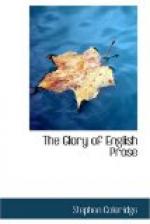In these days, Antony, when peerages are bought by men successful in trade and sold by men successful in intrigue, such elevations in rank have ceased to be regarded as the necessary concomitants of “great honour” and “high and noble dignity”; so that it has long been more reputable in the House of Lords to be a descendant than an ancestor. But among the older great families there still remains a pride that has descended unsullied through many generations, which serves as a fine deterrent from evil deeds, and a constant incentive to honour—and in England the history of great names can never be totally ignored, even though the country may be ruled by persons who do not know who were their own grandfathers.
Nothing is more ridiculous and cheap than to sneer at honourable descent from famous ancestors; it divertingly illustrates the fable of the sour grapes.
Your loving old
G.P.
7
MY DEAR ANTONY,
You will have seen from the extracts I have already quoted to you of the writers of the Elizabethan age that the style of all of them possesses something large and resonant, something that may be said to constitute the “grand style” in prose; and this quite naturally without effort, and without the slightest touch of affectation.
A great writer who came immediately after the Elizabethans—namely, Sir Thomas Browne, who lived from 1605 to 1682—displays the development in his style of something less simple and more precious than ruled in the former generation.
It is difficult to select any passage from his works where all is so good. He was curious and exact in his choice of words and commanded a wide vocabulary. There is deliberate ingenuity in the framing of his sentences, which arrests attention and markedly distinguishes his style. His Urn Burial, in spite of its elaboration, reaches a grave and solemn splendour.
The fifth chapter, which begins by speaking of the dead who have “quietly rested under the drums and tramplings of three conquests,” rises to a very noble elevation as English prose.
Here I quote one paragraph of it, characteristic of the whole:—
“Darkness and light divide the course of time, and oblivion shares with memory a great part even of our living beings; we slightly remember our felicities, and the smartest strokes of affliction leave but short smart upon us. Sense endureth no extremities, and sorrows destroy us or themselves. To weep into stones are fables. Afflictions induce callosities; miseries are slippery, or fall like snow upon us, which notwithstanding is no unhappy stupidity. To be ignorant of evils to come, and forgetful of evils past, is a merciful provision in nature, whereby we digest the mixture of our few and evil days, and, our delivered senses not relapsing into cutting remembrances, our sorrows are not kept raw by the edge of repetitions.




